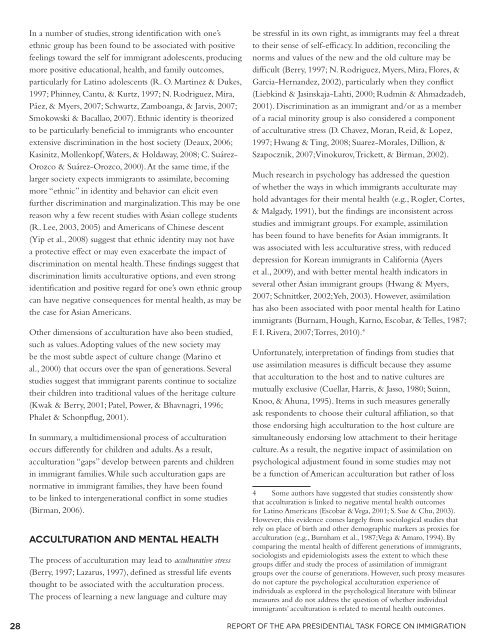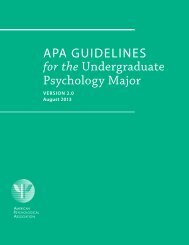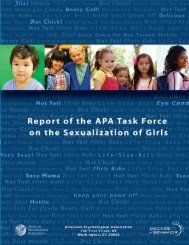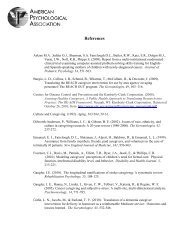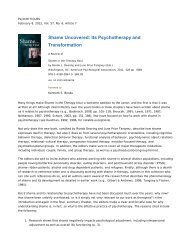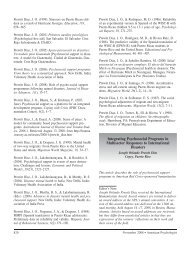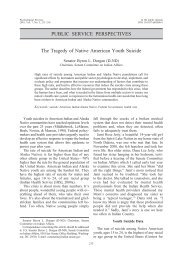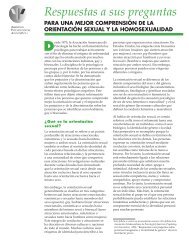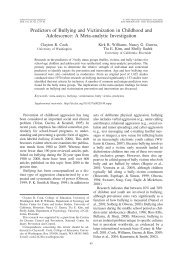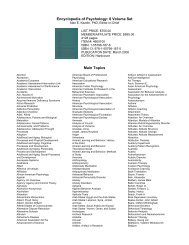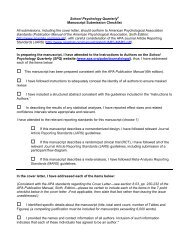Crossroads: The Psychology of Immigration in the New Century
Crossroads: The Psychology of Immigration in the New Century
Crossroads: The Psychology of Immigration in the New Century
You also want an ePaper? Increase the reach of your titles
YUMPU automatically turns print PDFs into web optimized ePapers that Google loves.
In a number <strong>of</strong> studies, strong identification with one’s<br />
ethnic group has been found to be associated with positive<br />
feel<strong>in</strong>gs toward <strong>the</strong> self for immigrant adolescents, produc<strong>in</strong>g<br />
more positive educational, health, and family outcomes,<br />
particularly for Lat<strong>in</strong>o adolescents (R. O. Mart<strong>in</strong>ez & Dukes,<br />
1997; Ph<strong>in</strong>ney, Cantu, & Kurtz, 1997; N. Rodriguez, Mira,<br />
Páez, & Myers, 2007; Schwartz, Zamboanga, & Jarvis, 2007;<br />
Smokowski & Bacallao, 2007). Ethnic identity is <strong>the</strong>orized<br />
to be particularly beneficial to immigrants who encounter<br />
extensive discrim<strong>in</strong>ation <strong>in</strong> <strong>the</strong> host society (Deaux, 2006;<br />
Kas<strong>in</strong>itz, Mollenkopf, Waters, & Holdaway, 2008; C. Suárez-<br />
Orozco & Suárez-Orozco, 2000). At <strong>the</strong> same time, if <strong>the</strong><br />
larger society expects immigrants to assimilate, becom<strong>in</strong>g<br />
more “ethnic” <strong>in</strong> identity and behavior can elicit even<br />
fur<strong>the</strong>r discrim<strong>in</strong>ation and marg<strong>in</strong>alization. This may be one<br />
reason why a few recent studies with Asian college students<br />
(R. Lee, 2003, 2005) and Americans <strong>of</strong> Ch<strong>in</strong>ese descent<br />
(Yip et al., 2008) suggest that ethnic identity may not have<br />
a protective effect or may even exacerbate <strong>the</strong> impact <strong>of</strong><br />
discrim<strong>in</strong>ation on mental health. <strong>The</strong>se f<strong>in</strong>d<strong>in</strong>gs suggest that<br />
discrim<strong>in</strong>ation limits acculturative options, and even strong<br />
identification and positive regard for one’s own ethnic group<br />
can have negative consequences for mental health, as may be<br />
<strong>the</strong> case for Asian Americans.<br />
O<strong>the</strong>r dimensions <strong>of</strong> acculturation have also been studied,<br />
such as values. Adopt<strong>in</strong>g values <strong>of</strong> <strong>the</strong> new society may<br />
be <strong>the</strong> most subtle aspect <strong>of</strong> culture change (Mar<strong>in</strong>o et<br />
al., 2000) that occurs over <strong>the</strong> span <strong>of</strong> generations. Several<br />
studies suggest that immigrant parents cont<strong>in</strong>ue to socialize<br />
<strong>the</strong>ir children <strong>in</strong>to traditional values <strong>of</strong> <strong>the</strong> heritage culture<br />
(Kwak & Berry, 2001; Patel, Power, & Bhavnagri, 1996;<br />
Phalet & Schonpflug, 2001).<br />
In summary, a multidimensional process <strong>of</strong> acculturation<br />
occurs differently for children and adults. As a result,<br />
acculturation “gaps” develop between parents and children<br />
<strong>in</strong> immigrant families. While such acculturation gaps are<br />
normative <strong>in</strong> immigrant families, <strong>the</strong>y have been found<br />
to be l<strong>in</strong>ked to <strong>in</strong>tergenerational conflict <strong>in</strong> some studies<br />
(Birman, 2006).<br />
acculturation and Mental Health<br />
<strong>The</strong> process <strong>of</strong> acculturation may lead to acculturative stress<br />
(Berry, 1997; Lazarus, 1997), def<strong>in</strong>ed as stressful life events<br />
thought to be associated with <strong>the</strong> acculturation process.<br />
<strong>The</strong> process <strong>of</strong> learn<strong>in</strong>g a new language and culture may<br />
be stressful <strong>in</strong> its own right, as immigrants may feel a threat<br />
to <strong>the</strong>ir sense <strong>of</strong> self-efficacy. In addition, reconcil<strong>in</strong>g <strong>the</strong><br />
norms and values <strong>of</strong> <strong>the</strong> new and <strong>the</strong> old culture may be<br />
difficult (Berry, 1997; N. Rodriguez, Myers, Mira, Flores, &<br />
Garcia-Hernandez, 2002), particularly when <strong>the</strong>y conflict<br />
(Liebk<strong>in</strong>d & Jas<strong>in</strong>skaja-Lahti, 2000; Rudm<strong>in</strong> & Ahmadzadeh,<br />
2001). Discrim<strong>in</strong>ation as an immigrant and/or as a member<br />
<strong>of</strong> a racial m<strong>in</strong>ority group is also considered a component<br />
<strong>of</strong> acculturative stress (D. Chavez, Moran, Reid, & Lopez,<br />
1997; Hwang & T<strong>in</strong>g, 2008; Suarez-Morales, Dillion, &<br />
Szapocznik, 2007; V<strong>in</strong>okurov, Trickett, & Birman, 2002).<br />
Much research <strong>in</strong> psychology has addressed <strong>the</strong> question<br />
<strong>of</strong> whe<strong>the</strong>r <strong>the</strong> ways <strong>in</strong> which immigrants acculturate may<br />
hold advantages for <strong>the</strong>ir mental health (e.g., Rogler, Cortes,<br />
& Malgady, 1991), but <strong>the</strong> f<strong>in</strong>d<strong>in</strong>gs are <strong>in</strong>consistent across<br />
studies and immigrant groups. For example, assimilation<br />
has been found to have benefits for Asian immigrants. It<br />
was associated with less acculturative stress, with reduced<br />
depression for Korean immigrants <strong>in</strong> California (Ayers<br />
et al., 2009), and with better mental health <strong>in</strong>dicators <strong>in</strong><br />
several o<strong>the</strong>r Asian immigrant groups (Hwang & Myers,<br />
2007; Schnittker, 2002; Yeh, 2003). However, assimilation<br />
has also been associated with poor mental health for Lat<strong>in</strong>o<br />
immigrants (Burnam, Hough, Karno, Escobar, & Telles, 1987;<br />
F. I. Rivera, 2007; Torres, 2010). 4<br />
Unfortunately, <strong>in</strong>terpretation <strong>of</strong> f<strong>in</strong>d<strong>in</strong>gs from studies that<br />
use assimilation measures is difficult because <strong>the</strong>y assume<br />
that acculturation to <strong>the</strong> host and to native cultures are<br />
mutually exclusive (Cuellar, Harris, & Jasso, 1980; Su<strong>in</strong>n,<br />
Knoo, & Ahuna, 1995). Items <strong>in</strong> such measures generally<br />
ask respondents to choose <strong>the</strong>ir cultural affiliation, so that<br />
those endors<strong>in</strong>g high acculturation to <strong>the</strong> host culture are<br />
simultaneously endors<strong>in</strong>g low attachment to <strong>the</strong>ir heritage<br />
culture. As a result, <strong>the</strong> negative impact <strong>of</strong> assimilation on<br />
psychological adjustment found <strong>in</strong> some studies may not<br />
be a function <strong>of</strong> American acculturation but ra<strong>the</strong>r <strong>of</strong> loss<br />
4 Some authors have suggested that studies consistently show<br />
that acculturation is l<strong>in</strong>ked to negative mental health outcomes<br />
for Lat<strong>in</strong>o Americans (Escobar & Vega, 2001; S. Sue & Chu, 2003).<br />
However, this evidence comes largely from sociological studies that<br />
rely on place <strong>of</strong> birth and o<strong>the</strong>r demographic markers as proxies for<br />
acculturation (e.g., Burnham et al., 1987; Vega & Amaro, 1994). By<br />
compar<strong>in</strong>g <strong>the</strong> mental health <strong>of</strong> different generations <strong>of</strong> immigrants,<br />
sociologists and epidemiologists assess <strong>the</strong> extent to which <strong>the</strong>se<br />
groups differ and study <strong>the</strong> process <strong>of</strong> assimilation <strong>of</strong> immigrant<br />
groups over <strong>the</strong> course <strong>of</strong> generations. However, such proxy measures<br />
do not capture <strong>the</strong> psychological acculturation experience <strong>of</strong><br />
<strong>in</strong>dividuals as explored <strong>in</strong> <strong>the</strong> psychological literature with bil<strong>in</strong>ear<br />
measures and do not address <strong>the</strong> question <strong>of</strong> whe<strong>the</strong>r <strong>in</strong>dividual<br />
immigrants’ acculturation is related to mental health outcomes.<br />
28 Report <strong>of</strong> <strong>the</strong> APA Presidential Task Force on <strong>Immigration</strong>


